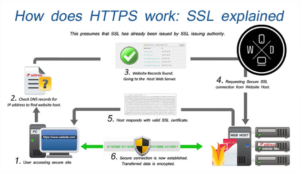7 Best Ways to Protect E-Commerce Customer Data
Next-gen technologies and faster bandwidth speed have given the E-Commerce industry much-needed wings to soar to new heights. The global e-commerce industry was estimated to be US$ 9.09 trillion in the year 2019. It was forecasted to grow at a CAGR of 14.7% between 2020 till 2027.
However, one of the critical mistakes that e-commerce companies make is the lack of data security infrastructure. Most smaller players feel that they are too small to be targeted.
On the contrary, statistics from the Verizon Business 2020 Data Breach Investigations Report show at least 407 incidents at small companies, with at least 221 confirmed data breach events. Businesses of all sizes must imbibe a robust security process to ensure eCommerce security.
This article will discuss some of the crucial ways to protect customer data.
Collect Only the Relevant Data
We have come across e-commerce sites that collect vast volumes of customer data, including their mobile numbers, social security numbers, etc., during registration. Most companies do not need such vast volumes of data. Any data breach can lead to the data being your liability, along with hefty penalties from government agencies and loss of customer trust. You must have information policies in place and restrict yourself to only collecting the relevant information. It is also unsafe to manage the financial information of your customers. Also, have appropriate policies in place regarding the employees who will have access to customer information and the time for which you will store the data.
Shift to an HTTPS System
If you are in the e-commerce industry, you must adhere to the PCI-DSS guidelines. It requires you to shift to the more secure HTTPS platform.
You must install an SSL certificate that will help you encrypt the communication between the web server and the visitor’s browser. As a result, no third party can access the communication, which will help protect e-commerce customer data.
(Source: https://websitedepot.com/ssl-certificate-work)
Visitors to a non-HTTPS website get a warning that the site is “Not Secure.” As a result, such websites have a lower footfall as the visitors are wary of visiting an insecure website. Your conversion rate will also go down. Moreover, search engines like Google give preference to HTTPS websites during keyword search rankings. Consider buying a cheap SAN SSL certificate that will allow you to secure multiple domains (hostnames) with a single certificate.
Keep the Applications Updated:
One of the ideal ways to protect your site is to keep the applications updated. It always helps to use only premium themes for your website. The reason is that most of the free themes are not updated regularly. Hackers can take advantage of the vulnerabilities and wreak havoc on your website.
If you are using a content management system, always keep it updated to the latest version. You can set alerts that will notify you about any pending updates in the system.
To protect e-commerce data, you must not download free plug-ins to lead to weaknesses in your website. As an additional precaution, you must also ensure the operating systems are also updated periodically.
Use Strong Passwords:
Would you prefer to have a weak password for your banking accounts? So, why would you not have a robust password system for your customers? Always ensure that the website requires customers to create strong passwords based on global best practices. It will act as one of the pillars to protect e-commerce customer data.
(Source: https://www.ekransystem.com/en/blog/password-policy-compliance-checklist)
Also, ensure that you include a password policy in the overall IT policy for your business. The password for your employees must be strong, and you must ideally use a single-sign-on system for all the applications that are run across the company. Password managers can also help your employees select strong passwords for the office’s various software.
Restrict Access for Your Employees:
You must have good security processes in place to ensure eCommerce security. Always keep in mind that many security breaches have resulted from internal personnel. Access to the website must be restricted only to the relevant personnel. You must have a proper audit log mechanism to log the team’s entries to access the database. The IT team must also restrict access across the networks through robust passwords. The network passwords must be changed after regular intervals. A proper audit trail process can help you to pinpoint any unauthorized access and plug such loopholes. Periodic penetration testing across your networks and the website can also help to protect e-commerce data.
Encryption Across the Systems:
One of the best ways to protect E-Commerce data is to encrypt sensitive data like passwords. Securing them is not easy, and you need specialized techniques to encrypt them. Using intrusion prevention systems like firewalls, defining roles, etc., can be an elementary way of protection. Most use an encryption mechanism, but they can also be decrypted using an encryption key. Hashing is an improved method of encryption that is usually used in network communications. The process of hashing adds a security layer by preventing any tampering with the encrypted data. And why only the passwords? You can utilize specialized services to encrypt the storage device that contains customer data.
Ensure Application of Extra Protective Measures:
It is essential not to store financial information, as hackers may use this information for fraudulent means if they can get their hands on them. You can utilize third-party providers’ services to handle the payments for you. Storing this information can put your business in severe danger. Always utilize specialized platforms like Authorize.Net, PayPal, and other similar options to handle payment processing. They have adequate security apparatus in place to protect the financial data of your customers. If this information is compromised, you can find yourself in serious legal trouble.
Conclusion
Security breaches over the internet are increasing over the years. The e-commerce industry is also facing severe data privacy issues. One of the basic security  mechanisms you can put in place is to install an SSL certificate to protect E-Commerce data. It also helps if you educate your customers too regularly. We have listed out a few of the ways you can put in place for eCommerce security. You must have a solid internal IT policy to prevent any data breaches.
mechanisms you can put in place is to install an SSL certificate to protect E-Commerce data. It also helps if you educate your customers too regularly. We have listed out a few of the ways you can put in place for eCommerce security. You must have a solid internal IT policy to prevent any data breaches.
Author: Dan Radak is a web hosting security professional with ten years of experience. He is currently working with a number of companies in the field of online security, closely collaborating with a couple of e-commerce companies.



























